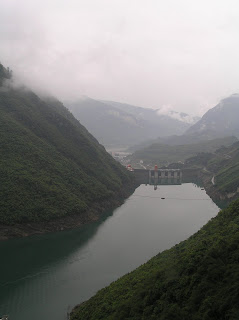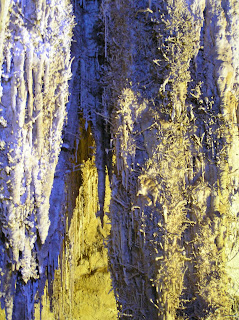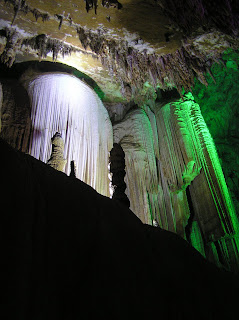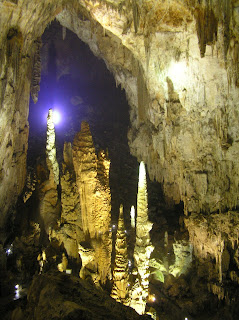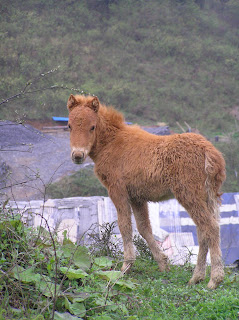I remember a time not long past, in America, when the French were the butt of almost every joke, even removed from the title of a popular form of junk food. "Surrenderers" and "whiners", were the two most common insults leveled against our Gallic rivals. Why? Because they had the temerity to protest the US invasion of Iraq, as well as the American government's general unwillingness to sit down and negotiate with its (in the case of Iraq, chosen) enemies. They often played devil's advocate in the world court of opinions to American propositions. Many a red-blooded American patriot was wishing a pox upon France, and only for an opinion. I remember thinking how silly all that posturing and hurt pride was.
These days I imagine that France (and its bubbly liquor) must once again be the toast of Washington. With Sarkozy--a conservative and pro-American president--leading the fifth republic there should be much reduced tension across the Atlantic and an end to hyper-nationalist stunts along the lines of 'freedom fries'.
So imagine my astonishment to once again become mired in the midst of a lot of very similarly silly, and somewhat scary, anti-French furor.
But then again, I'm not living in America, am I?
What do the Chinese have against France? The answer is that the pro-Tibetan protests during the Olympic torch's journey through Paris were perhaps the most harrowing thus far. Of particular value as a symbol to stir up nationalist zeal was the video of French protesters attempting to wrest the torch from the grip of a Chinese paralympian in a wheelchair--which I will agree was not in the best of taste. But protests were equally dramatic in London, or even at the lighting of the torch in Greece, and protests in San Francisco probably would have beat them all in melodrama (here's my own patriotic spirit speaking) if only the torch and its organizers hadn't been running away/hiding from their own crowd.
But is this offense, Parisians to blame as usual, really enough to hang a whole country on? Well, there is also the matter of Sarkozy hinting at not attending the opening ceremony of the Beijing Olympics.
For Chinese college students--and other nationalists--apparently these reasons are all that is needed to cause a rampage of rumors and rabid rhetoric. For the last week or two, the big gossip going around amongst some Chinese teachers, staff, and students at my school has been the alleged crimes of Carrefour. For those who don't know it, Carrefour is the French answer to Wal-Mart, now with hyper-marts hyper-expanding across China.
I'll be clear on my Carrefour bias before we go further: I was once a fan of the store when they had a good selection of cheeses (and thus was my trusty Cheese depot in my long march across China in Fall 2006), but the chain has fallen on disfavor with the House of Bruce since it axed the line of Mainland brand cheeses, leaving me with more expensive/smaller portions/lower-quality Land 'o Lakes as the only option. (Chinese brand cheese, not content with the horrors perpetrated upon cheese-kind by the American processed cheese, has come upon the new low of 'Chocolate-flavored' processed cheese. Yuck!)
Alright, good, I feel better for getting that off my chest. So, disapproval of cheeses aside, Carrefour is a pretty good super-store with a decent selection of products fit for both Chinese and international tastes. This is also a big, multi-national corporation that largely eschews both politics and humanitarian worries. I see little reason why it would be caught involving itself with Tibetans given that there is no percentage in that with either its French customers or its Chinese customers. So why attack Carrefour?
Because it is within easy reach. With stores (or multiple stores) in every major Chinese city, the average Chinese net-patriot and his friends can easily organize a protest without having to run very far from their favorite
wangba (internet bar). There are only a few French embassies/consulates, after all, but many, many hyper-markets. The newest capitalist playground demands plenty of consumer shrines, after all.
That's the simple explanation (and my best guess). The more convoluted reasoning relies on a lot of conspiracy theory and sixth-hand sources. I've probably only heard the tip of the iceberg, but it goes something like this: A major shareholder in Carrefour gave money to support the Dalai Lama. Carrefour is going to plan a huge sale to coincide with Chinese anti-pro-Tibet protests and then secretly photograph Chinese people attending the sale instead of protests. Carrefour is a French company, France's president wants the CCP to hold talks with the Dalai Lama, therefore....
Yeah, a bit silly. I mean, let us consider that Carrefour was planning a huge sale, not randomly, but during a major Chinese national holiday when every major store in China holds major sales. Is this unreasonable for a profit-seeking company?
But like I say, Carrefour provides a convenient target through which to condemn a distant and faceless enemy, the same as Walmart provides back in the States. For young patriots with their blood riled, need there be more reasonable arguments for boycott?
I don't know about Carrefour branches nation-wide, but the local outlet really doesn't need this kind of excitement. Last summer, this Carrefour attempted to hold a sale on cooking oil in celebration of its 10th anniversary. Seven people were trampled to death, and more than twenty were badly injured in the mad rush to obtain that golden liquid.
Like it or not, however, excitement is coming this way. Yesterday, as Jon and I strolled back through the walking-mall to our apartment (which is sited in a tower directly above the Carrefour) after a long day at work, we encountered a protest march--also on its way to Carrefour.
Giant crimson flags of the PRC were waved by the vanguard, and we could hear the chanting: "Jiayou Zhongguo! Jiayou Zhongguo!" (this translates either figuratively as, "Go China! Go China!" or literally and somewhat erotically as "Oil-up China! Oil-up China." Yes, perhaps the Sino-Gallic feud could be solved by an oily, homo-erotic Greco-Roman wrestling match.)
I'll admit, I felt tension running through me, for the first time witnessing an open display of the nationalist fury I've been hearing via the internet for some time. I can understand as well what it must feel like for Chinese students in other countries to see protests which are (or which they would consider to be) anti-Chinese. There is a very unsettled feeling in one's stomach, knowing that your surroundings bear this sometimes subtle, sometimes outright, hostility towards you.
The emotion aside, the boycotting protest was actually fairly small, mostly composed of students--young people who were small children or didn't yet exist during the 1989 Tiananmen massacre--many of whom looked not particularly upset or even emotional, just going along for the fun. There were also a few policemen in black uniforms, stoic expressions on their faces, just going along to make sure things didn't get out of hand. The march was little different, or more threatening, than the many protests of the Iraq war held on/near my own university campus when I was there. In fact, I would say that students in other countries probably have more opportunities to march, protest, boycott--and often more violently--than this pale comparison I beheld. And unlike the march protesting 'raised government taxes' held by local small-shopkeepers that I had witnessed upon the exact same ground last year, there was no immediate and violent police attack on the protest.
Having marched all the way around the apartment block--in the basement of which Carrefour crouches--the protesters settled upon a small plaza and began to wave flags with the zealotry of those who have nothing better to do. Jon and I stopped for a minute to converse with a doleful, young university lecturer who had been filming the protest. His first comment, "It is good you weren't wearing Tibetan flags on your t-shirts or this would be a bad place for you!" (We were wearing shirts with the Aston School logo.) It turns out that not only was he very concerned about the dangers of 'angry young men' who protest, but also quite concerned that these angry young men weren't good representatives of China to the world. I guess if I plan to stay any longer in this often difficult, often hostile country, it is good to know that there are some Chinese (and he's not the only one I've met) who have a gentle nature and more interest in solving China's humanitarian problems than saving face.
Neither Jon nor I had our cameras, so we raced back to the apartment to grab them. The first thing we wished to demonstrate, was that despite the protest, the vast majority of people were indeed more interested in shopping for snacks and 'Hello-Kitty' knickknacks than defending the injured pride of the motherland.
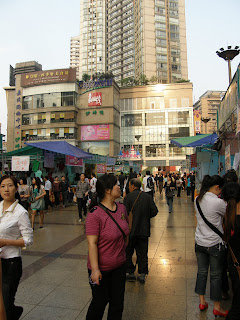
I guess the older Chinese--those that survived civil war, the Great Leap Forward famine, the Cultural Revolution, and the many riots accompanying 1989 Tiananmen, the less-wise ones having perished--have learned an eternal truth of life in China: It is wiser to shop for trivialities than to involve yourself in politics and revolution. I know that one of my adult students, for example, whose friend was shot by the police in the 1989 protests, is deeply concerned about the rising tide of 'angry young men' and their inability to consider the Tibetan perspective.
Unfortunately, by the time we arrived at the protests with Jon's camera in hand (my camera battery was not charged), the police had arrived and put an end to the day's entertainment. More protests had been planned for today, actually, but rain (and the police, I imagine) have put a stop to that.
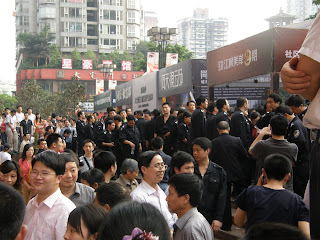
Unfortunately, the protests did take a toll: Carrefour was closed for the rest of the day. It was a good thing indeed, that I had bought my peanut-butter and jelly sandwich materials earlier in the day, or I would have been right pissed. However, the store was open again when I went there today, so no harm-no foul.

There are other tolls, less obvious, that also result from the rising tide of chauvinism. One is that foreigners (businessmen, teachers, and tourists) are likely to feel less welcome here. Already, myself and the other foreign teachers at my school have made our plans for a quick escape from China if the situation worsens. Flight is first option--being the speediest, with direct flights to Bangkok from Chongqing--but busing across Yunnan would be lovely as well. The local minorities are unlikely to have any concern for the wounded pride of Han Chinese, and in a pinch I believe they may aid foreigners in distress.
Tony, one of our teachers, is feeling particularly discomfited. Having been in Thailand during last year's military coup, not speaking any Chinese, and not being familiar with China, I can understand how it is a distressing situation for him. It probably doesn't help that one of our Chinese teachers is wrapped up in the chauvinist furor, and continually brings the matter up in class or in the teacher's lounge--neither place is really appropriate for haggling over such emotional viewpoints.
As for Carrefour, let us hope for the best. True, I was ready to join the protest myself... with a placard demanding a wider selection of cheese! But let us not forget that the real issue here is not France. They may be world-class whiners and agitators, but that hardly makes them uncommon human beings much less monsters. Boycotting Carrefour also does not accomplish anything worthwhile. A boycott does not significantly hurt the economy of France--a country filled with people of diverse opinions; it does nothing to increase world respect for China, nor its (in my opinion) irresponsible and unresponsive governing party, the CCP; it does not make Sarkozy or any other world leaders more likely to attend the opening ceremonies of the Beijing Olympics; it does not pressure CNN to apologize for mislabeled photographs or to fire Jack Cafferty (whose insulting words for China were rather unprofessional and childish, I must say); most importantly a boycott of Carrefour does absolutely nothing to resolve the Tibetan problems that have not been solved, nor even addressed, during 50 years of rule by the CCP. The inherent problem that has caused protests in Paris, and thus reactionary protests in China, has nothing to do with the average Chinese person nor the average Western person.
The problem lies squarely in the deceitful and exploitive relationship between the CCP (Chinese Communist Pary) and the Tibetan people. Any action, or argument, that does not lead towards resolution of this fundamental problem is a useless and self-satisfying act. To be fair, I aim this remark at Western protesters as well--as often as not they are more concerned with outsourced jobs or Chinese military expansion than the plight of Tibetan Buddhists.
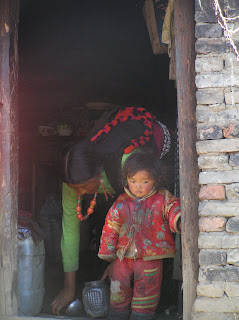
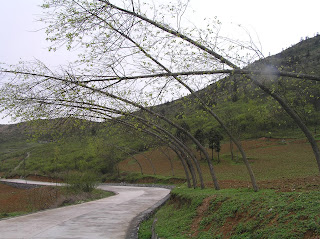
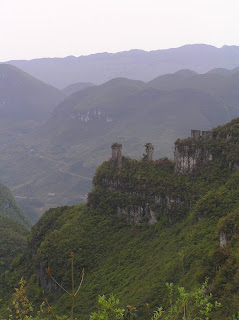 Inching out onto the precipice that formed her throne, Cherry and I gave the otherworldly woman our obeisance and abject trembling. Well, perhaps it was the fear of heights that caused trembling, not fear of a rain-worn karstic statue. However, the view her royal fairyness commanded was indeed magnificent and well worth the trembling. The trail itself ventured tremulously upon limestone cracked and worn like ancient fangs. A slab of concrete had been placed helpfully across a final chasm for those wanderers--such as us--too frightened of the bone-crunching drop to leap across.
Inching out onto the precipice that formed her throne, Cherry and I gave the otherworldly woman our obeisance and abject trembling. Well, perhaps it was the fear of heights that caused trembling, not fear of a rain-worn karstic statue. However, the view her royal fairyness commanded was indeed magnificent and well worth the trembling. The trail itself ventured tremulously upon limestone cracked and worn like ancient fangs. A slab of concrete had been placed helpfully across a final chasm for those wanderers--such as us--too frightened of the bone-crunching drop to leap across.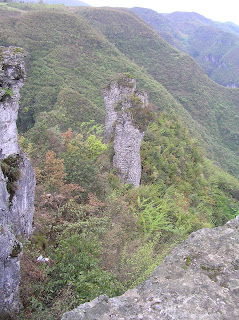 The rest of Fairy Maiden mountain, unfortunately, is not so exciting. I think that the main product on offer there was peace, and plenty of it as long as one avoids the desperate staff of the ghost town of crumbling tourist traps, over-built resort hotels, and closed-up shops. There are prairies aplenty as well as dark forests of hemlock to wander in for hours... and not much else.
The rest of Fairy Maiden mountain, unfortunately, is not so exciting. I think that the main product on offer there was peace, and plenty of it as long as one avoids the desperate staff of the ghost town of crumbling tourist traps, over-built resort hotels, and closed-up shops. There are prairies aplenty as well as dark forests of hemlock to wander in for hours... and not much else.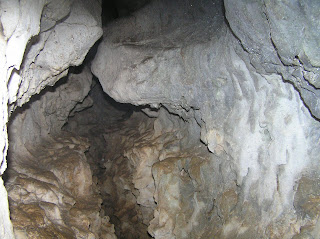 The last stop on our itinerary was the famed tian keng san qiao, or 'Three Natural Bridges' National Geopark, also a UNESCO World Heritage Preserve. Can words describe the freaky wonder of that place?
The last stop on our itinerary was the famed tian keng san qiao, or 'Three Natural Bridges' National Geopark, also a UNESCO World Heritage Preserve. Can words describe the freaky wonder of that place?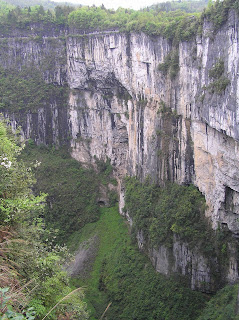
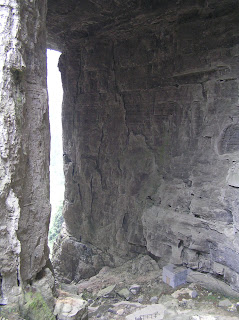
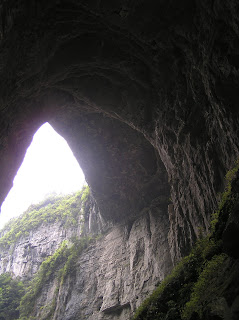 In the previous installment we mentioned karst (a type of limestone formation). Now I should explain what a tian keng is. The tian keng literally translates as a "heavenly pit", but figuratively might mean "a hole as great as the sky". Essentially, it is a sinkhole. In karst areas, sometimes great caverns crawl beneath the land, many kilometers in length and often several hundred feet in height and width. In some places the cavern collapses, leaving deep canyons gouged from the earth. This was one such place, but in three places along the tian keng, the ceiling had remained. Thus natural bridges were created across new chasms.
In the previous installment we mentioned karst (a type of limestone formation). Now I should explain what a tian keng is. The tian keng literally translates as a "heavenly pit", but figuratively might mean "a hole as great as the sky". Essentially, it is a sinkhole. In karst areas, sometimes great caverns crawl beneath the land, many kilometers in length and often several hundred feet in height and width. In some places the cavern collapses, leaving deep canyons gouged from the earth. This was one such place, but in three places along the tian keng, the ceiling had remained. Thus natural bridges were created across new chasms.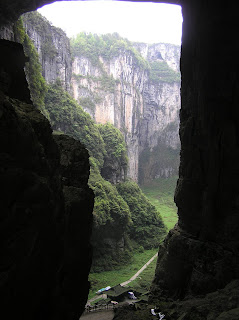
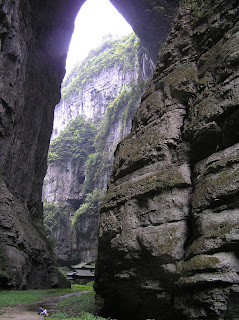 (Note Cherry washing her feet in the creek, as well as the traditional house, for size comparison of the Tian Keng.)
(Note Cherry washing her feet in the creek, as well as the traditional house, for size comparison of the Tian Keng.)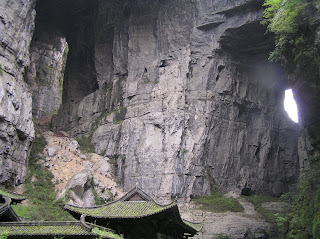
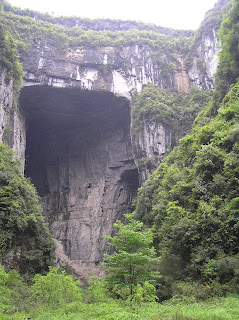 Further along the tian keng canyon, through the bamboo thickets surrounding the pathway and past waterfalls that jet from small cave fissures in the cliffside, we came to the second bridge which is several hundred meters high (and supposedly the highest natural bridge in the world, but not only can I not find confirmation of this claim elsewhere, but multiple other natural bridges and arches in China and around the world seem to make the same claim). This second bridge is named Qing Long or "Green Dragon".
Further along the tian keng canyon, through the bamboo thickets surrounding the pathway and past waterfalls that jet from small cave fissures in the cliffside, we came to the second bridge which is several hundred meters high (and supposedly the highest natural bridge in the world, but not only can I not find confirmation of this claim elsewhere, but multiple other natural bridges and arches in China and around the world seem to make the same claim). This second bridge is named Qing Long or "Green Dragon".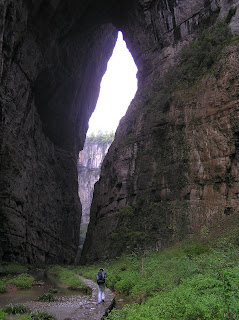 Finally we came to Hei Long, or "Black Dragon" bridge, a long, dark passage that cries tears... that is, several waterfalls spray down from orifices high on the chasm wall.
Finally we came to Hei Long, or "Black Dragon" bridge, a long, dark passage that cries tears... that is, several waterfalls spray down from orifices high on the chasm wall.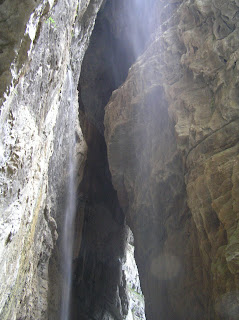
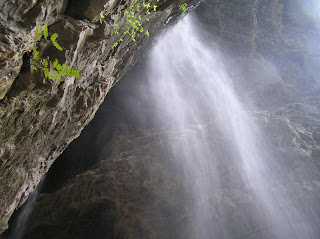
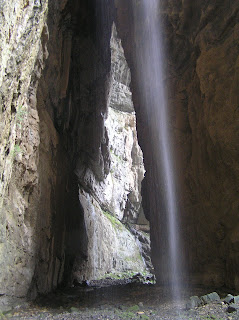
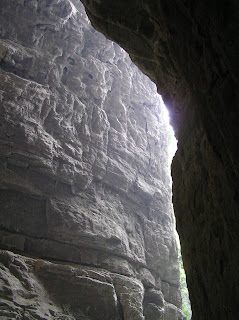 Are you that person?
Are you that person?
